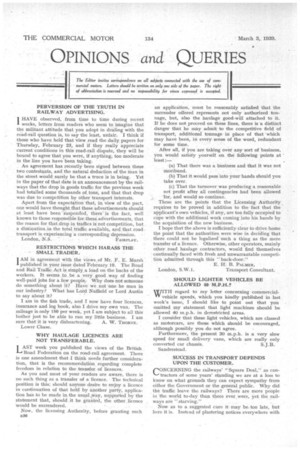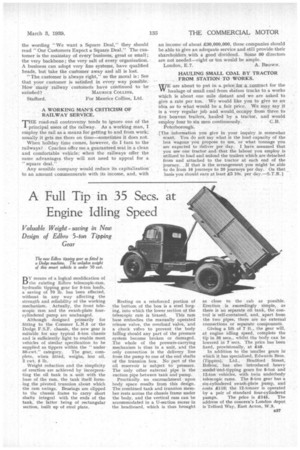OPINIONS and O UERIES
Page 46

Page 47

If you've noticed an error in this article please click here to report it so we can fix it.
The Editor invites coriespondence on all subjects connected with the use of commercial motors Letters should be written on only one side of the paper The right of abbreviation is reserved and no responsibility for views expressed is accepted.
PERVERSION OF THE TRUTH IN RAILWAY ADVERTISING.
I HAVE observed, from time to time during recent
weeks, letters from readers who seem to imagine that the militant attitude that you adopt in dealing with the road-rail question is, to say the least, unfair. I think if those who have held that view read the daily, papers for Thursday, February 23, and if they really appreciate current conditions in this road-rail dispute, they will 'be bound to agree that you were, if anything, too moderate in the line you have been taking.
An agreement has recently been signed between these two contestants, and the natural deduction of the man in the street would surely be that a truce is in being. Yet in the paper of that date is an announcement by the railways that the drop in goods traffic for the previous week had totalled some thousands of tons, and that that drop was due to competition by other transport interests.
Apart from the expectation that, in view of the pact, one would have thought that these advertisements should at least have been 'suspended, thereis the fact, well known to those respensible for these advertisements, that the reason for that drop in traffics is not competition, but a diminution in the total traffic available, and that road transport is experiencing a corresponding depression.
London, N.5. • FAIRPLAY.
RESTRICTIONS WHICH HARASS THE SMALL TRADER.
I AM in agreement with the views, of Mr. ,F. E. Marsh published in your issue dated 'February 10. The Road and Rail Traffic.Act is, simply a load on the backs of the workers. It seezas to .be a very good way of finding well-paid jobs for a few people. Why does not soineone do something about it?Have we not one he man in our industry? What has Lord Nuffield or Lord Austin to say about it?
I am in the fish trade, and I now have four licences, insurance and log book, also I drive my own van. The mileage is .only 150 per week, yet I am subject to all this bother just to be able to run my little business. I am
sure that it is very disheartening. A. W. THORNE. Lower Chase.
WHY HAULAGE LICENCES ARE NOT TRANSFERABLE.
LAST week you published the views of the British 1–d Road Federation on the road-rail agreement. There is one amendment that I think needs further consideration, that is the recommendation regarding complete freedom in relation to the transfer of licences.
As you and most of your readers are aware, there is no such thing as a transfer of a licence. The technical position is this; should anyone desire to enjoy a licence in continuation of that held by another party, application has to be made in the usual ,way, supported by the statement that, should it be granted, the other licence would be surrendered.
Now, the licensing Authority, before granting such an application, must be reasonably satisfied that the surrender offered represents not only authorized tonnage, but, also the haulage good-will attached to it. If he does not proceed on these lines, there is a distinct danger that he may admit to the competitive field of transport, additional tonnage in place of that which may have been, in every sense of the word, redundant for some time.
'After all, if You are taking over any sort of business, you would satisfy yourself on the following points at ' least :— (a) That there was a business and that it was not moribund.
(b) That it would pass into your hands should you take over.
(c) That the turnover was producing a reasonable net profit after all contingencies had been allowed -for, and would so continue.
These are the points that the Licensing Authority, requires to be proved in addition to the fact that the applicant's own vehicles, if any, are too fully occupied to cope with the additional work coming into his hands by the acquisition of the new business.
I hope that the above is sufficiently clear to drive home the point that the authorities were wise in deciding that there could not be legalized such a thing as the mere transfer of a licence. Otherwise, other operators, mainly other road haulage contractors, would find themselves continually faced with fresh and unwarrantable competition admitted through this "back-door," E. H. B. PALMER, London, S.W.1. Transport Consultant.
SHOULD LIGHTER VEHICLES BE ALLOWED 40 M.P.H.?
AvITH regard to my letter concerning commercialVI' vehicle speeds, which you kindly published in last week's issue, I should like to point out that you omitted my statement that light machines should be allowed 40 m.p.h. in derestricted areas.
I consider that these light vehicles, which are classed as motorcars, are those which should be encouraged, although possibly you do not agree.
Furthermore, the present 30 m.p.h. is a very slow speed for small delivery vans, which are really only converted car chassis.
Sanderstead.
SUCCESS IN TRANSPORT DEPENDS UPON THE CUSTOMER.
CONCERNING the railways' "Square Deal," as contractors of some years' standing we are at a loss to know on what grounds they can expect sympathy from either the Government or the general public. Why did the traffic leave the railways? There are more people in the world to-day than there ever were, yet the railways are ".starving."
Now as to a suggested cure it may be, too late, but here it is. Instead of plastering notices everywhere with the wording "We want a Square Deal," they should read "Our Customers Expect a Square Deal." The customer is the mainstay of every' business, great or small ; the very backbone; the very salt of every organization. A business can adopt very fine systems, have qualified heads, but take the customer away and all is lost.
"The customer is always right," so the moral is : See that your customer is satisfied in every way possible. How many railway customers have continued to be satisfied? MAURICE COLLINS, Stafford. For Maurice Collins, Ltd.
A WORKING MAN'S CRITICISM OF RAILWAY SERVICE.
THE road-rail controversy tends to ignore one of the principal users of the railway. As a working man, I employ the rail as a means for getting to and from work; usually it gets me there on time—sometimes it does not.
When holiday time comes, however, do I turn to the railways? Coaches offer me a guaranteed seat in a clean and comfortable vehicle; when the railways offer the same advantages they will not need to appeal for a "square deal."
Any sensible company would reduce its capitalization to an amount commensurate with its income, and, with
an income of about £30,000,000, these companies should be able to give an adequate service and still provide their shareholders with a good dividend. Some 80 directors are not needed—eight or ten would be ample.
London, E.7. A. BROWN.
HAULING SMALL COAL BY TRACTOR FROM STATION TO WORKS.
WE are about to put in a. price for agitract for the VI' haulage of small coal from station trucks to a works which is about one mile distant and we are asked to give a rate per ton. We would like you to give us an idea as to what would be a fair price. We may say it is a very regular job and would, occupy from three to five boxvan trailers, hauled by a tractor, and would
employ four to six men continuously. C.B. Peterborough.
[The information you give in your inquiry is somewhat scant. You do not say what is the load capacity of the box wagons you propose to use, or what tonnage you are expected to deliver per day. I have assumed that you use one tractor and that the labour you employ is utilized to load and unload the trailers which are detached from and attached to the tractor at each end of the journey. If that is the arrangement you might be ,able to do from 16 journeys to 20 journeys per day. On that basis you should earn at least £5 10s, per day.—S.T.R.1




















































































